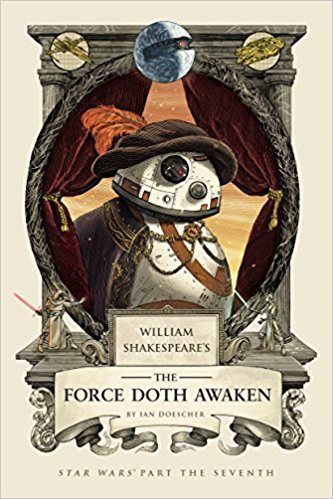
I wanted to have this review up on May the Fourth, but I was slacking a little too hard yesterday. So I’m just going to pretend today’s another Star Wars holiday—Revenge of the Fifth, anyone?
When I was in high school, I was the freak who actually loved Shakespeare. My favourite play is Othello, but I always enjoyed the Shakespeare unit in English class. My classmates rarely agreed with me, but I didn’t care. I loved the language and the stories—I understood the tragic, flawed characters.
So when I discovered the Shakespeare and Star Wars crossover books a couple years ago, it was a match made in heaven. The stories and characters from Star Wars, plus the beautiful Shakespearean language? Sign me up.
Now, a disclaimer: I’m not a fan of Disney canon and how the new films treat the original characters. In a nutshell, I believe TPTB regressed Leia, Han, and Luke to who they were before the original trilogy—making any of their character development completely null and void. In my heart of hearts, Disney canon is not my canon.
However, unless I never want to see another new Star Wars movie or enjoy another book or piece of merchandise, I’m gonna have to accept that I will have fundamental disagreements with the way things are handled in the sequel trilogy, and I need to just enjoy the films for what they are—someone else’s interpretation of my beloved franchise and characters.
With all that being said, I won’t be reviewing the actions and plot line of The Force Awakens—I’ll just be discussing the interpretation of that plot in the eyes of Shakespeare. If I were to dissect what I disliked in The Force Awakens, it would distract too much from the main review. I’ll save those thoughts for another post.
As usual, Ian Doescher perfectly captures Shakespeare’s voice while still remaining true to the characters and the spirit of Star Wars. The internal monologues and soliloquies really help to develop the new characters in a way the movies were unable to do. I fell more in love with Rey, Poe, and Finn when I read their inner thoughts and I despised Kylo Ren, especially after reading his thoughts during Han’s death scene.
But my favourite interactions were between Han and Leia (is anyone really surprised?). They had more scenes together than in the movie, and their “new” relationship was better developed and explored—I felt like I understood these new versions, whereas I was just plain confused in the theatre. I still don’t agree with the direction they’ve taken, but I understand it better in this book.
Overall, if you’re a Star Wars fan and you love Shakespeare, you need this book (and all the others) in your life. It’s not really a parody—it’s a faithful adaptation that’s fun to read.